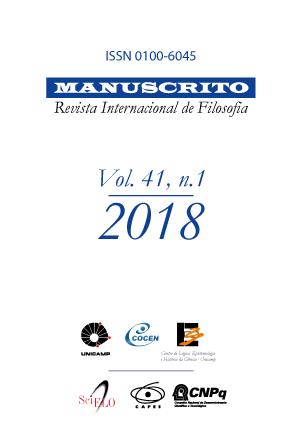Resumo
As principais teorias do conteúdo perceptivo são incapazes de explicar o caráter fenomênico singular da experiência perceptiva. Tal dificuldade, conforme argumento, se origina da ausência de uma série de distinções que acaba tornando o problema aparentemente insolúvel. Após analisar brevemente as principais deficiências da teoria representacionalista e do realismo ingênuo, apresento uma proposta que pretende tornar não problemático o fato trivial de percebermos objetos particulares que se apresentam enquanto tais em nossas experiências perceptivas. A proposta, assim como a crítica às demais alternativas, são reconhecidamente apresentadas de forma breve e esquemática. Espera-se ao menos justificar que o caminho proposto é promissor e vale a aposta.Referências
BAYNE, T. & MONTAGUE, M. (eds.). Cognitive Phenomenology. Oxford: Oxford University Press, 2011.
BREWER, B. “Realism and the Nature of Perceptual Experience”. Philosophical Issues, 14 (1), pp. 61-77, 2004.
BROGAARD, B. (ed.). Does Perceptions have Contents? Oxford: Oxford University Press, 2014.
CAMPBELL, J. Reference and Consciousness. Oxford: Oxford University Press, 2002.
CHALMERS, D. (ed.). Philosophy of Mind: Classical and contemporary readings. Oxford: Oxford University Press, 2002.
CHALMERS, D. “Perception and the Fall from Eden”. In: T. S. GENDLER; J. HAWTHORNE (eds.) (2006), pp. 49-125.
CRANE, T. Elements of Mind. Oxford: Oxford University Press, 2001.
DRETSKE, F. Naturalizing the Mind. Cambridge, MA: The MIT Press, 1995.
EVANS, G. The Varieties of Reference. Oxford: Clarendon Press, 1982.
FISH, W. “Disjunctivism, Indistinguishability and the Nature of Hallucination”. In: A. HADDOCK; F. MACPHERSON (eds.) (2008), pp. 144-167.
FISH, W. Perception, Hallucination, and Illusion. Oxford: Oxford University Press, 2009.
GENDLER, T. S. & HAWTHORNE, J. (eds.). Perceptual Experience. Oxford: Clarendon Press, 2006.
GRICE, H. P. The Causal Theory of Perception. Proceedings of the Aristotelian Society, Supplementary Volumes, 35 (1), pp. 121-152, 1961.
HADDOCK, A. & MACPHERSON, F. (eds.). Disjunctivism: Perception, Action, Knowledge. Oxford: Oxford University Press, 2008.
HAWTHORNE, J. & KOVAKOVICH, K. “Disjunctivism”. Proceedings of the Aristotelian Society, Supplementary Volumes, 80 (1), pp. 145-83, 2006.
HORGAN, T. & TIENSON, J. “The intentionality of phenomenology and the phenomenology of intentionality”. In: D. CHALMERS (ed.), pp. 520-533, 2002.
KAPLAN, D. “On the Logic of Demonstratives”. Journal of Philosophical Logic, 8 (1), pp. 81-98, 1978.
LYCAN, W. Consciousness and Experience. Cambridge, MA: The MIT Press, 1996.
MACPHERSON, F. & PLATCHIAS, D. (eds.). Hallucination: Philosophy and Psychology. Cambridge, MA: The MIT Press, 2013.
MARTIN, M. “The Limits of Self-Awareness”. Philosophical Studies, 120 (1), pp. 37-89, 2004.
MCDOWELL, J. “De re senses”. Philosophical Quarterly, 34, pp. 283-294, 1984.
MONTAGUE, M. “The phenomenology of particularity”. In: T. BAYNE; M. MONTAGUE (eds.), pp. 121-140, 2011.
PAUTZ, A. “Can Disjunctivists Explain Our Access to the Sensible World?” Philosophical Issues, 21 (1), pp. 384-434, 2011.
SCHELLENBERG, S. “The particularity and phenomenology of perceptual experience”. Philosophical Studies, 149 (1), pp. 19-48, 2010.
SCHELLENBERG, S. “Externalism and the Gappy Content of Hallucination”. In: F. MACPHERSON; D. PLATCHIAS (eds.), pp. 291-311, 2013.
SCHELLENBERG, S. “The relational and representational character of perceptual experience”. In: B. BROGAARD (ed), pp. 199-219, 2014.
SCHELLENBERG, S. “Perceptual Particularity”. Philosophical and Phenomenological Research, 93 (1), pp. 25-54, 2016.
SIEGEL, S. The Contents of Visual Experience. Oxford: Oxford University Press, 2010.
TYE, M. Ten Problems of Consciousness: A Representational Theory of the Phenomenal Mind. Cambridge, MA: The MIT Press, 1995.
TYE, M. Consciousness Revisited: Materialism without Phenomenal Concepts. Cambridge, MA: The MIT Press, 2009.
TYE, M. “What is the Content of a Hallucinatory Experience?” In: B. BROGAARD (ed.), pp. 291-309, 2014.

